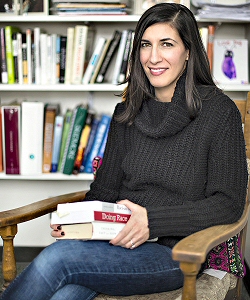Gender, race and prejudice
"As an experimental social psychologist, I'm interested in how people see each other and how that affects their interactions," says Leigh Wilton, who joined Skidmore's psychology faculty last year. Her work focuses on race and gender. "People have expectations about gender and race," she says, "but what happens when they encounter challenges to those beliefs, such as people who have mixed-race or nontraditional gender identities? What are the consequences, in terms of interpersonal and group relations, of the assumptions we hold?"

Leigh Wilton
The essentialist school of thought holds that these identities are mostly in-born
and immutable, rather than socially constructed and learned. But as Wilton points
out, there's no support for a scientific concept of race, and she asks, "If people
see racial traits as genetically hard-wired, what do they think when they meet people
of mixed-race parentage?
For Wilton, it's more than academic. With a Latina mother and white father, she grew
up with a natural curiosity about what social identities really mean and also with
a drive to test ways of improving social interactions across difference.
In Wilton's research on race and gender stigma, participants read about a person's
attitudes or comments or actions, decide if that person has a prejudice, and then
predict how that person would treat them in an interaction. Of course people of color
tend to feel a stigma threat from those they see as racist, and women feel threatened
by perceived sexists. But Wilton's research (reported mostly recently in the January
2017 Psychological Science journal) also explores "prejudice transfer," by which white women feel vulnerable
to gender-stigma from racists and black men anticipate race-stigma from sexists. A
presumption among her participants was that a generalized social dominance underlies
both racism and sexism, so a person harboring either bias would likely exhibit at
least some of the other bias as well. Such intersectionality studies can illuminate
often-unrecognized impediments to open and productive interactions.
Every semester, Wilton's lab trains students in every aspect of its work. She describes
her research-methods course as "both challenging and rewarding, for the students and
for me. Learning how to use statistics, design a study well, and apply critical thinking
is so helpful in any pursuit, and it's gratifying to see how much confidence the students
gain when they learn these skills."
Before entering academe, Wilton worked as a consultant for businesses in the US and
abroad, where she learned the importance of communication within and across cultures.
She also learned that she wanted a career in learning. At Skidmore, she says, "I really
value the ability to shape my own questions and follow where they lead. And it's so
rewarding to work with students, not only in the classroom but also in the lab, where
we build even more collaborative mentoring relationships."
Among her projects for the future is a study of bystander intervention in bias incidents.
"Studies show it can be quite effective in altering attitudes and behavior," she explains,
"but it's very difficult to do well. The situations are usually complex and tricky;
many factors can change how they play out." Students are eagerly and deeply involved
in that research, as they are in her investigations of how essentialism regarding
gender may influence social policies affecting women and other groups. In Wilton's
field, there's no shortage of questions that need answers.


